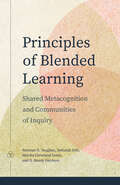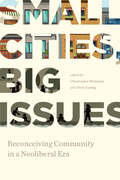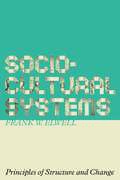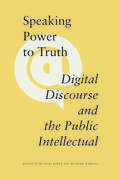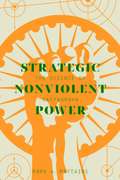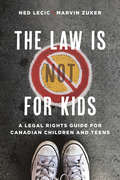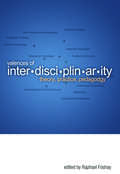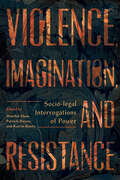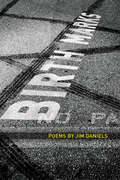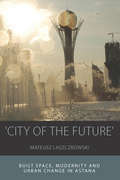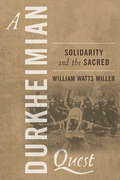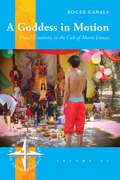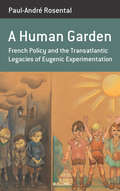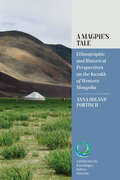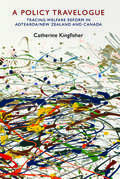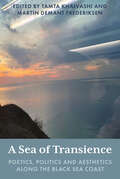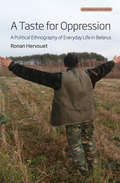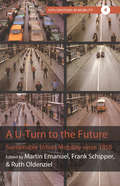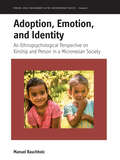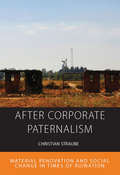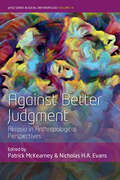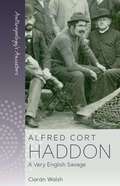- Table View
- List View
Principles of Blended Learning: Shared Metacognition and Communities of Inquiry (Issues in Distance Education)
by D. Randy Garrison Norman D. Vaughan Martha Cleveland-Innes Deborah DellThe rapid migration to remote instruction during the Covid-19 pandemic has expedited the need for more research, expertise, and practical guidelines for online and blended learning. A theoretical grounding of approaches and practices is imperative to support blended learning and sustain change across multiple levels in education organizations, from leadership to classroom. The Community of Inquiry is a valuable framework that regards higher education as both a collaborative and individually constructivist learning experience. The framework considers the interdependent elements of social, cognitive, and teaching presence to create a meaningful learning experience. In this volume, the authors further explore and refine the blended learning principles presented in their first book, Teaching in Blended Learning Environments: Creating and Sustaining Communities of Inquiry, with an added focus on designing, facilitating, and directing collaborative blended learning environments by emphasizing the concept of shared metacognition.
Small Cities, Big Issues: Reconceiving Community in a Neoliberal Era
by Christopher Walmsley Terry KadingSmall Canadian cities confront serious social issues as a result of the neoliberal economic restructuring practiced by both federal and provincial governments since the 1980s. Drastic spending reductions and ongoing restraint in social assistance, income supports, and the provision of affordable housing, combined with the offloading of social responsibilities onto municipalities, has contributed to the generalization of social issues once chiefly associated with Canada’s largest urban centres. As the investigations in this volume illustrate, while some communities responded to these issues with inclusionary and progressive actions others were more exclusionary and reactive—revealing forms of discrimination, exclusion, and “othering” in the implementation of practices and policies. Importantly, however their investigations reveal a broad range of responses to the social issues they face. No matter the process and results of the proposed solutions, what the contributors uncovered were distinctive attributes of the small city as it struggles to confront increasingly complex social issues. If local governments accept a social agenda as part of its responsibilities, the contributors to Small Cities, Big Issues believe that small cities can succeed in reconceiving community based on the ideals of acceptance, accommodation, and inclusion.
Sociocultural Systems: Principles of Structure and Change
by Frank W. ElwellMacrosociology—the study of large-scale social structures and the fundamental principles of social organization—was the style of sociology practiced by the founders of the discipline. Today, the social theories of Karl Marx, Max Weber, Émile Durkheim, and Herbert Spencer (among others) are commonly studied as part of the history of the field, but, although the macrosociological approach that these thinkers advocated is still employed, it no longer dominates the discipline. Instead, sociologists typically adopt a narrower focus, specializing in areas such as social psychology, medicine, religion, or the study of social stratification. Examining the bigger picture is a task often left to public intellectuals. Sociocultural Systems aims to reinstate macrosciology as the heart of the discipline by demonstrating that both classical and contemporary macrosociologists stand upon common ground. Focusing on the broad issues that concerned the founders, Elwell addresses questions such as: Historically, what factors accounted for the origin, survival, and evolution of sociocultural systems? Why were some societies more technologically advanced than others? What is the origin of capitalism? What factors determine the allocation of goods and services within and among societies? What effects do changes in government and economic institutions have on communities? Elwell argues that, as evolution does for biology, the macrosociological paradigm offers an analytical strategy that can be used both to guide and prioritize research in all of the myriad specialties within sociology and to lay forth an orderly body of knowledge for students. Clearly articulating important sociological principles, Sociocultural Systems provides a critical understanding of social institutions and issues, while also furnishing a framework for possible solutions to the perennial social crises that are part and parcel of the development of human societies.
Speaking Power to Truth: Digital Discourse and the Public Intellectual
by Michael Keren Richard HawkinsOnline discourse has created a new media environment for contributions to public life, one that challenges the social significance of the role of public intellectuals—intellectuals who, whether by choice or by circumstance, offer commentary on issues of the day. The value of such commentary is rooted in the assumption that, by virtue of their training and experience, intellectuals possess knowledge—that they understand what constitutes knowledge with respect to a particular topic, are able to distinguish it from mere opinion, and are in a position to define its relevance in different contexts. When intellectuals comment on matters of public concern, they are accordingly presumed to speak truth, whether they are writing books or op-ed columns or appearing as guests on radio and television news programs. At the same time, with increasing frequency, discourse on public life is taking place online. This new digital environment is characterized by abundance—an abundance of speakers, discussion, and access. But has this abundance of discourse—this democratization of knowledge, as some describe it—brought with it a corresponding increase in truth?Casting doubt on the assertion that online discourse, with its proliferation of voices, will somehow yield collective wisdom, Speaking Power to Truth raises concerns that this wealth of digitally enabled commentary is, in fact, too often bereft of the hallmarks of intellectual discourse: an epistemological framework and the provision of evidence to substantiate claims. Instead, the pursuit of truth finds itself in competition with the quest for public reputation, access to influence, and enhanced visibility. But as knowledge is drawn into the orbit of power, and as the line between knowledge and opinion is blurred, what role will the public intellectual play in the promotion and nurturing of democratic processes and goals? In exploring the implications of the digital transition, the contributors to Speaking Power to Truth provide both empirical evidence of, and philosophical reflection on, the current and future role of the public intellectual in a technologically mediated public sphere. With contributions by Karim-Aly Kassam, Barrry Cooper, Jacob G. Foster, Richard Hawkins, Michael Keren, Boaz Miller, Liz Pirnie, and Eleanor Townsley.
Strategic Nonviolent Power: The Science of Satyagraha
by Mark MattainiHistory indicates that there are powerful routes to liberation from oppression that do not involve violence. Mohandas Gandhi called for a science of nonviolent action, one based on satyagraha, or the “insistence on truth.” As Gandhi understood, nonviolent resistance is not passive, nor is it weak; rather, such action is an exercise of power. Despite the success of Gandhi’s “Quit India” movement, the resources dedicated to the application of rigorous science to nonviolent struggle have been vanishingly small. By contrast, almost unimaginable levels of financial and human resources have been devoted to the science and technologies of killing, war, and collective violence. Mark Mattaini reviews the history and theory of nonviolent struggles against oppression and discusses recent research that indicates the substantial need for and advantage of nonviolent alternatives. He then offers a detailed exploration of principles of behavioral systems science that appear to underlie effective strategic civil resistance and “people power.” Strategic Nonviolent Power proposes that the route to what Gandhi described as the “undreamt of and seemingly impossible discoveries” of nonviolent resistance is the application of rigorous science. Although not a simple science, Mattaini’s application of ecological science grounded in the science of behaviour brings exceptional power to the struggle for justice and liberation. At a time when civil resistance is actively reshaping global political realities, the science of nonviolent struggle deserves the attention of the scientific, activist, strategic, military, spiritual, and diplomatic communities, as well as the informed public.
The Law is (Not) for Kids: A Legal Rights Guide for Canadian Children and Teens
by Ned Lecic Marvin A. ZukerIn this practical guide to the law for young people of Canada, Ned Lecic and Marvin Zuker provide an all-encompassing manual meant to empower and educate children and youth and those that serve them. The authors address questions about how rights and laws affect the lives of young people at home, at school, at work, and in their relationships as they draw attention to the many ways in which a person’s life can intersect with the law. Deliberately refraining from taking a moral approach, the authors instead advocate for the rights of children and provide examples of how young people can get their legal rights enforced. In addition to being critical information for youth about citizenship, The Law is (Not) for Kids is a valuable resource for teachers, counsellors, lawyers, and all those who support youth in their encounters with the law.
Valences of Interdisciplinarity: Theory, Practice, Pedagogy
by Raphael FoshayThe modern university can trace its roots to Kant's call for enlightened self-determination, with education aiming to produce an informed and responsible body of citizens. As the university evolved, specialized areas of investigation emerged, enabling ever more precise research and increasingly nuanced arguments. In recent decades, however, challenges to the hegemony of disciplines have arisen, partly in response to a perceived need for the university to focus greater energy on its public vocation—teaching and the dissemination of knowledge. Valences of Interdisciplinarity presents essays by an international array of scholars committed to enhancing our understanding of the theoretical underpinnings and the practical realities of interdisciplinary teaching and research. What is, and what should be, motivating our reflections on (and practice of) approaches that transcend the conventional boundaries of discipline? And in adopting such transdisciplinary approaches, how do we safeguard critical methods and academic rigour? Reflecting on the obstacles they have encountered both as thinkers and as educators, the authors map out innovative new directions for the interdisciplinary project. Together, the essays promise to set the standards of the debate about interdisciplinarity for years to come.
Violence, Imagination, and Resistance: Socio-legal Interrogations of Power
by Katrin Roots Mariful Alam Patrick DwyerMuch of the discussion of social transformation and resistance in socio-legal studies centres around the question of whether and how the law can be used to achieve practical change. However, the editors of this volume argue that it will never be possible to enact change through the law because it is inseparable from violence, be it metaphysical, social, or political. They posit that a “just world,” free from oppressive power relations, requires us to imagine communities where the state and its law cease to exist. Contributors address the underexplored questions of what alternatives to law could look like: how communities could organize their everyday lives, and how they could address social and interpersonal conflicts outside of an apparatus of violence. These essays contribute to the ongoing interrogation of settler colonialism, racism, and structural violence in Canada by demonstrating how to expose the violence the law produces, how to deconstruct law’s power, and, finally, how to identify modes of resistance that have transformative potential.
Birth Marks (American Poets Continuum)
by Jim DanielsIn Birth Marks, Jim Daniels examines how our origins mark us forever. From Detroit to Pittsburgh, he explores the lives of ordinary people in a world which often seems tilted against them. His tough, unflinching poems recount family myths, urban decay, his own lies, and the struggle for survival in a post-industrial world as the economy crumbles around us.
Gogoetak: Hiritarren eta estatu gizonaren brebiarioa
by Charles Louis de Secondat Felipe Juaristi GaldosZoriona edo zorigaitza, on edo gaitz ote den, barne-organoak nolakoak diren. Onean, istripuek, aberastasunek, ohoreek, osasun-kontuek, gaixotasunek ematen edo kentzen dute zoriona. Haatik, gaitzean, istripuek luzatzen edo laburtzen dute zorigaitza. Zorionaz edo zorigaitzaz mintzatzen garenean, tronpatu egiten gara beti; egoerak aztertzen baititugu, eta ez gizonak. Egoeraren bat ez da sekula zorigaiztokoa izango, baldin eta gustukoa bada; eta, esaten dugunean gizon bat, halako egoeraren batean egonik, zorigaiztokoa dela, ez dugu esan nahi gu ere, dauzkagun organoak edukirik, zorigabekoak izango ginatekeenik haren tokian bageunde. Gogoetak
Los ojos del otro: Encuentros restaurativos entre víctimas y ex miembros de ETA
by Esther Pascual Rodríguez«Personalmente, pensaba que el encuentro no me aportaría gran cosa, pero no fue así. Cuando él apareció en la salita donde nos encontramos y, después de las presentaciones, nos miramos a los ojos, me di cuenta de lo mal que lo estaba pasando. Creo que estaba como avergonzado... Estuvimos hablando y preguntándonos durante casi tres horas. No quiero entrar en detalles, pero lo que más me impresionó durante la conversación fue lo que repetía una y otra vez; tenía la autoestima por los suelos, no veía nada bueno en él y decía: ?Todo en mí es malo?, ?No hay nada bueno en mí?. Le dije que eso no era cierto: ?Si lo fuera, no estaríamos aquí ninguno de los dos?. Y añadí: ?Creo que has sido muy valiente en reconocer todo el daño causado, has sabido comprender que todo lo que hiciste en el pasado fue un gravísimo error y has pedido perdón por ello; pero, lo más importante, has recuperado tu libertad y el derecho a ser un ciudadano?. Las personas que hemos colaborado en los encuentros restaurativos, tanto los victimarios como las víctimas, lo hemos hecho de forma voluntaria. Nadie nos lo ha impuesto. Sin embargo, entiendo, sobre todo desde el mundo de las víctimas, la crítica, que a veces ha sido desproporcionada, hacia las personas que hemos decidido participar. Así como nosotros respetamos su decisión, su postura de no querer participar, me gustaría pedir que también nuestra opción sea respetada; nosotros no nos sentimos mejores ni peores, simplemente actuamos según nuestra forma de pensar» (Tomado del Prólogo, de Maixabel Lasa). Han colaborado en el presente volumen: Alberto José Olalde Altarejos / Francisca Lozano Espina / Esther Pascual Rodríguez / José Luis Segovia Bernabé / Julián Carlos Ríos Martín / Eduardo Santos Itoiz / José Castilla Jiménez / Luis María Carrasco Asenguinolaza / Xabier Etxebarria Zarrabeitia.
'City of the Future': Built Space, Modernity and Urban Change in Astana (Integration and Conflict Studies #14)
by Mateusz LaszczkowskiAstana, the capital city of the post-Soviet Kazakhstan, has often been admired for the design and planning of its futuristic cityscape. This anthropological study of the development of the city focuses on every-day practices, official ideologies and representations alongside the memories and dreams of the city's longstanding residents and recent migrants. Critically examining a range of approaches to place and space in anthropology, geography and other disciplines, the book argues for an understanding of space as inextricably material-and-imaginary, and unceasingly dynamic – allowing for a plurality of incompatible pasts and futures materialized in spatial form.
A Durkheimian Quest
by William Watts MillerDurkheim, in his very role as a 'founding father' of a new social science, sociology, has become like a figure in an old religious painting, enshrouded in myth and encrusted in layers of thick, impenetrable varnish. This book undertakes detailed, up-to-date investigations of Durkheim's work in an effort to restore its freshness and reveal it as originally created. These investigations explore his particular ideas, within an overall narrative of his initial problematic search for solidarity, how it became a quest for the sacred and how, at the end of his life, he embarked on a project for a new great work on ethics. A theme running through this is his concern with a modern world in crisis and his hope in social and moral reform. Accordingly, the book concludes with a set of essays on modern times and on a crisis that Durkheim thought would pass but which now seems here to stay.
A Goddess in Motion: Visual Creativity in the Cult of MarÃa Lionza (New Directions in Anthropology #42)
by Roger CanalsThe current practice of the cult of María Lionza is one of the most important and yet unexplored religious practices in Venezuela. Based on long-term fieldwork, this book explores the role of images and visual culture within the cult. By adopting a relational approach, A Goddess in Motion shows how the innumerable images of this goddess-represented as an Indian, white or mestizo woman-move constantly from objects to bodies, from bodies to dreams, and from the religion domain to the art world. In short, this book is a fascinating study that sheds light on the role of visual creativity in contemporary religious manifestations.
A Human Garden: French Policy and the Transatlantic Legacies of Eugenic Experimentation (Berghahn Monographs in French Studies #16)
by Paul-André RosentalWell into the 1980s, Strasbourg, France, was the site of a curious and little-noted experiment: Ungemach, a garden city dating back to the high days of eugenic experimentation that offered luxury living to couples who were deemed biologically fit and committed to contractual childbearing targets. Supported by public authorities, Ungemach aimed to accelerate human evolution by increasing procreation among eugenically selected parents. In this fascinating history, Paul-André Rosental gives an account of Ungemach’s origins and its perplexing longevity. He casts a troubling light on the influence that eugenics continues to exert—even decades after being discredited as a pseudoscience—in realms as diverse as developmental psychology, postwar policymaking, and liberal-democratic ideals of personal fulfilment.
A Magpie’s Tale: Ethnographic and Historical Perspectives on the Kazakh of Western Mongolia (Lifeworlds: Knowledges, Politics, Histories #1)
by Anna Odland PortischTelling the story of the author's time living with a Kazakh family in a small village in western Mongolia, this book contextualizes the family’s personal stories within the broader history of the region. It looks at the position of the Kazakh over time in relation to Tsarist Russian, Soviet, Chinese and Mongolian rule and influence. These are stories of migration across generations, bride kidnappings and marriage, domestic violence and alcoholism, adoption and family, and how people have coped in the face of political and economic crisis, poverty and loss, and, perhaps most enduringly, how love and family persist through all of this.
A Policy Travelogue: Tracing Welfare Reform in Aotearoa/New Zealand and Canada
by Catherine KingfisherAn ethnography of the development and travel of the New Zealand model of neoliberal welfare reform, this study explores the social life of policy, which is one of process, motion, and change. Different actors, including not only policy élites but also providers and recipients, engage with it in light of their own resources and knowledge. Drawing on two analytic frameworks of the contemporary anthropology of policy-translation and assemblage-Kingfisher situates policy as an artifact and architect of cultural meaning, as well as a site of power struggles. All points of engagement with policy are approached as sites of policy production that serve to transform it as well as reproduce it. As such, A Policy Travelogue provides an antidote to theorizations of policy as a-cultural, rational, and straightforwardly technical.
A Sea of Transience: Poetics, Politics and Aesthetics along the Black Sea Coast
by Martin Demant Frederiksen Tamta KhalvashiTransience is found in every meeting and form of coexistence between people and things that live and exist by, or move across or along, the Black Sea. It may come in various forms and guises, from de facto states, tourism, migration, trafficking or military troops, and it needs to be written and captured in sensuous, affective and imaginative ways. With particular attention to poetics, politics and aesthetics, this volume focuses on the scales of transient moments and histories, and enables readers to see and sense the many forms of transience that occur in a given landscape, sea or space.
A Taste for Oppression: A Political Ethnography of Everyday Life in Belarus (Anthropology of Europe #6)
by Ronan HervouetBelarus has emerged from communism in a unique manner as an authoritarian regime. The author, who has lived in Belarus for several years, highlights several mechanisms of tyranny, beyond the regime’s ability to control and repress, which should not be underestimated. The book immerses the reader in the depths of the Belarusian countryside, among the kolkhozes and rural communities at the heart of this authoritarian regime under Alexander Lukashenko, and offers vivid descriptions of the everyday life of Belarusians. It sheds light on the reasons why part of the population supports Lukashenko and takes a fresh look at the functioning of what has been called 'the last dictatorship in Europe'.
A Taste for Oppression: A Political Ethnography of Everyday Life in Belarus (Anthropology of Europe #6)
by Ronan HervouetBelarus has emerged from communism in a unique manner as an authoritarian regime. The author, who has lived in Belarus for several years, highlights several mechanisms of tyranny, beyond the regime’s ability to control and repress, which should not be underestimated. The book immerses the reader in the depths of the Belarusian countryside, among the kolkhozes and rural communities at the heart of this authoritarian regime under Alexander Lukashenko, and offers vivid descriptions of the everyday life of Belarusians. It sheds light on the reasons why part of the population supports Lukashenko and takes a fresh look at the functioning of what has been called 'the last dictatorship in Europe'.
A U-Turn to the Future: Sustainable Urban Mobility since 1850 (Explorations in Mobility #4)
by Ruth Oldenziel Martin Emanuel Frank SchipperFrom local bike-sharing initiatives to overhauls of transport infrastructure, mobility is one of the most important areas in which modern cities are trying to realize a more sustainable future. Yet even as politicians and planners look ahead, there remain critical insights to be gleaned from the history of urban mobility and the unsustainable practices that still impact our everyday lives. United by their pursuit of a “usable past,” the studies in this interdisciplinary collection consider the ecological, social, and economic aspects of urban mobility, showing how historical inquiry can make both conceptual and practical contributions to the projects of sustainability and urban renewal.
Adoption, Emotion, and Identity: An Ethnopsychological Perspective on Kinship and Person in a Micronesian Society (Person, Space and Memory in the Contemporary Pacific #8)
by Manuel RauchholzExploring adoption in the Pacific, this book goes beyond the commonplace structural-functional analysis of adoption as a positive “transaction in parenthood.” It examines the effects it has on adoptees’ inner sense of self, their conflicted emotional lives, and familial relationships that are affected by a personal sense of rejection and not belonging. This account is theoretically rooted in ethnopsychology, based on field work conducted across multiple research sites in the Chuuk Lagoon, its neighboring Chuukic-speaking atolls, and persons from neighboring Micronesian island communities.
After Corporate Paternalism: Material Renovation and Social Change in Times of Ruination (Integration and Conflict Studies #24)
by Christian StraubeIn this ethnographic study of post-paternalist ruination and renovation, Christian Straube explores social change at the intersection of material decay and social disconnection in the former mine township Mpatamatu of Luanshya, one of the oldest mining towns on the Zambian Copperbelt. Touching on topics including industrial history, colonial town planning, social control and materiality, gender relations and neoliberal structural change, After Corporate Paternalism offers unique insights into how people reappropriate former corporate spaces and transform them into personal projects of renovation, fundamentally changing the characteristics of their community.
Against Better Judgment: Akrasia in Anthropological Perspectives (WYSE Series in Social Anthropology #14)
by Patrick McKearney Nicholas H.A. EvansAnthropologists have long explained social behaviour as if people always do what they think is best. But what if most of these explanations only work because they are premised upon ignoring what philosophers call 'akrasia' – that is, the possibility that people might act against their better judgment? The contributors to this volume turn an ethnographic lens upon situations in which people seem to act out of line with what they judge, desire and intend. The result is a robust examination of how people around the world experience weaknesses of will, which speaks to debates in both the anthropology of ethics and moral philosophy.
Alfred Cort Haddon: A Very English Savage (Anthropology's Ancestors #5)
by Ciarán WalshAn innovative account of one of the least-understood characters in the history of anthropology. Using previously overlooked, primary sources Ciarán Walsh argues that Haddon, the grandson of anti-slavery activists, set out to revolutionize anthropology in the 1890s in association with a network of anarcho-utopian activists and philosophers. He regards most of what has been written about Haddon in the past as a form of disciplinary folklore shaped by a theory of scientific revolutions. The main action takes place in Ireland, where Haddon adopted the persona of a very English savage in a new form of performed photo-ethnography that constituted a singularly modernist achievement in anthropology. From the Introduction: Alfred Cort Haddon was written out of the story of anthropology for the same reasons that make him interesting today. He was passionately committed to the protection of simpler societies and their civilisations from colonists and their supporters in parliament and the armed forces.
